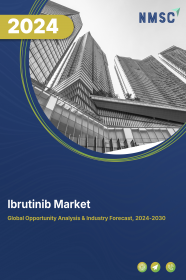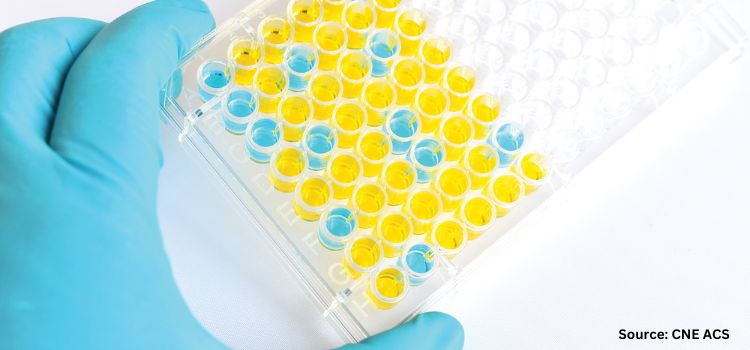
Ibrutinib Market by Product Type (140 mg, 10 mg, and 5 mg), by Application (Chronic Lymphocytic Leukemia (CLL), Mantle Cell Lymphoma (MCL), Diffuse Large B Cell Lymphoma (DLBCL), Multiple Myeloma (MM), and Follicular Lymphoma (FL))- Global Opportunity Analysis and Industry Forecast 2024 – 2030
US Tariff Impact on Ibrutinib Market
Trump Tariffs Are Reshaping Global Business
Market Definition
The Ibrutinib Market size was valued at USD 11.83 billion in 2023 and is expected to reach USD 61.88 billion by 2030, registering a CAGR of 23.10% from 2024 to 2030.
Ibrutinib is a chemical substance that is sold under the brand name Imbruvica. It belongs to a class of medications called kinase inhibitors. It helps to retard the spread of cancerous cells by blocking the action of abnormal proteins. It is used to treat chronic lymphocytic leukemia (CLL), Waldenstrom's macroglobulinemia. It is also considered for second-line treatment for mantle cell lymphoma, marginal zone lymphoma, and chronic graft.
Market Dynamics and Trends
The demand for ibrutinib had increased due to rising number of cancer patients across the world along with the increasing development of healthcare infrastructure related to cancer. Ibrutinib can be used to treat different types of blood cancer including Leukemia, Lymphoma and Myeloma. Thus, the increasing incidence of blood cancer is contributing to the demand for ibrutinib, in turn boosting the market growth. For instance, according to American Cancer Society in 2022, about 60,650 new cases of leukemia were diagnosed and out of which 24,000 people died due to leukemia.
Several market players such as Johnson and Johnson, Pfizer and Bluepharma are involved in development of generic drugs for treatment of cancer that is also expected to drive the growth of the ibrutinib market. For instance, in March 2022, Johnson & Johnson announced the submission of a Type II variation application to the European Medicines Agency (EMA) seeking approval of a new indication for IMBRUVICA (ibrutinib). It is combined with bendamustine and rituximab (BR) for the treatment of adult patients with previously untreated mantle cell lymphoma (MCL).
Also, several organizations such as Food and Drug Administration (FDA) and European Commission (EC) are actively involved in approval of cancer drugs that further drives the growth of the ibrutinib market during the forecast period. For instance, in April 2021, Zydus Cadila received approval from USFDA for use of their Ibrutinib Capsules. The company had received tentative approval from the United States Food and Drug Administration (USFDA) to market Ibrutinib tablets, in the strengths of 140 mg, 280 mg, 420 mg and 560 mg for treatment of cancer.
However, several health sides effects such as high blood pressure and diarrhea caused due to ibrutinib is expected to restrain the growth of the ibrutinib market during the forecast period. On the other hand, increase in R&D activities related to immunotherapy and radiotherapy using the inhibition techniques to stop cell excessive cell growth in the human body is expected to create ample growth opportunities for the market players in the upcoming years.
Market Segmentations and Scope of the Study:
The global ibrutinib market share is analyzed on the basis of product type, application, and geography. Based on product type, the market is segmented into 140 mg, 10mg, and 5mg. Based on application, the market is divided into chronic lymphocytic leukemia (CLL), mantle cell lymphoma (MCL), diffuse large b cell lymphoma (DLBCL), multiple myeloma (MM), and follicular lymphoma (FL). Geographic breakdown and analysis of each of the aforesaid segments include regions comprising North America, Europe, Asia-Pacific, and RoW.
Geographical Analysis
North America holds the lion’s share in the ibrutinib market at present and is expected to boost the growth of the market during the forecast period. This is attributed to factors such as the increasing prevalence of colon and rectum cancer along with the activities related to R&D in the field of oncology. For instance, according to the GLOBOCAN 2020 report, 101,809 cases of colon cancer, 44,780 cases of rectum cancer, and 26,259 cases of stomach cancer were reported in the U.S. Also, the rising prevalence of lymphatic diseases is further driving the growth of the ibrutinib market in this region.
On the other hand, Asia-Pacific region shows a steady rise in the ibrutinib market due to the increasing geriatric population suffering from cancer along with the development of healthcare facilities in countries such as China, Japan and India. In addition, the rising prevalence of blood and prostate cancer in turn drives the growth of the ibrutinib market in this region.
Competitive Landscape
Various market players operating in the ibrutinib market include Beacon Pharmaceuticals, Janssen Pharmaceuticals, Zydus Cadila, Pharmacyclics Inc., Johnson and Johnson, Incepta Pharmaceuticals, Bluepharma, ABBVie,Eli lilly and Company and AstraZenrca. These market players are adopting various strategies such as product approvals across various regions to maintain their dominance in ibrutinib market.
For instance, in April 2020, AbbVie Inc announced that the U.S. Food and Drug Administration (FDA) approved the use of IMBRUVICA® (ibrutinib) in combination with rituximab for the treatment of previously untreated patients with chronic lymphocytic leukemia (CLL) or small lymphocytic lymphoma (SLL). Also, in September 2020, Janssen Pharmaceutical announced that the European Commission (EC) approved a variation to the marketing authorization for IMBRUVICA® (ibrutinib).
Key Benefits
-
The ibrutinib market report provides the quantitative analysis of the current market and estimations through 2021-2030 that assists in identifying the prevailing market opportunities to capitalize on.
-
The study comprises a deep dive analysis of the ibrutinib market trend including the current and future trends for depicting the prevalent investment pockets in the market.
-
The information related to key drivers, restraints and opportunities and their impact on the ibrutinib market is provided in the report.
-
The competitive analysis of the market players along with their market share in the global ibrutinib market.
-
The SWOT analysis and Porters Five Forces model is elaborated in the study.
-
Value chain analysis in the market study provides a clear picture of the stakeholders’ roles.
Key Market Segments
By Product Type
-
140 mg
-
10 mg
-
5 mg
By Application
-
Chronic Lymphocytic Leukemia (CLL)
-
Mantle Cell Lymphoma (MCL)
-
Diffuse Large B Cell Lymphoma (DLBCL)
-
Multiple Myeloma (MM)
-
Follicular Lymphoma (FL)
By Geography
-
North America
-
U.S
-
Canada
-
Mexico
-
-
Europe
-
Germany
-
France
-
Italy
-
Spain
-
United Kingdom
-
Russia
-
Sweden
-
Rest of Europe
-
-
Asia-Pacific
-
Australia
-
China
-
India
-
Japan
-
South Korea
-
Indonesia
-
Singapore
-
Rest of Asia-Pacific
-
-
RoW
-
Brazil
-
South Africa
-
Israel
-
KSA (Kingdom of Saudi Arabia)
-
Turkey
-
Remaining Countries
-
Key Players
-
Beacon Pharmaceuticals
-
Janssen Pharmaceuticals
-
Zydus Cadila
-
Pharmacyclics Inc.
-
Johnson and Johnson
-
Incepta Pharmaceuticals
-
Bluepharma
-
ABBVie
-
Eli Lilly and Company
-
AstraZeneca

















 Speak to Our Analyst
Speak to Our Analyst





















